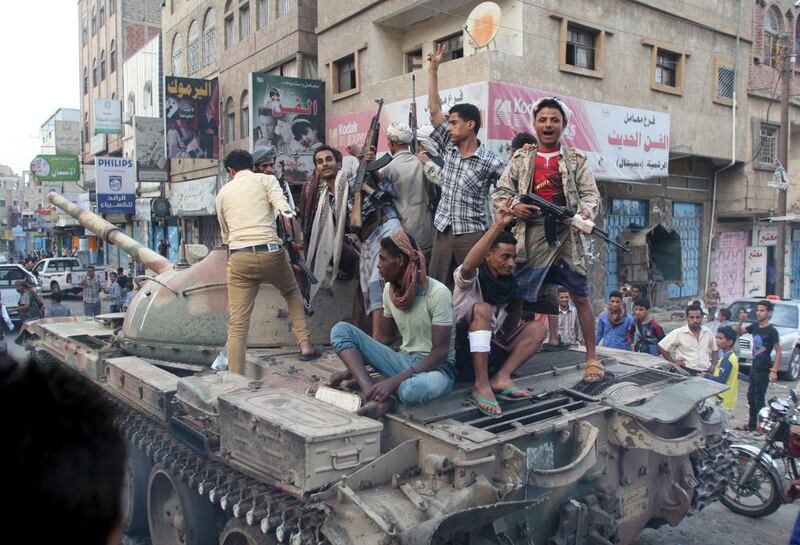ADEN // Before the current war in Yemen, Abu Mosab was a car mechanic in the Al Haseb area of Taez city.
But a month after the Houthi rebels – who ousted the government from the capital, Sanaa – began an offensive southward in late March, he was forced to flee Al Haseb for his family village in Al Shimayateen district.
There, the 35-year-old found himself without work and unsure of how to support his family, his savings dwindling, until in August he joined the Popular Resistance forces in Taez province.
The resistance fighters, aligned with the government, are fighting to drive the Houthis and their allies – military forces loyal to former president Ali Abdullah Saleh – from Taez province. Taez city, the provincial capital, is partly under the control of rebel forces, who have shelled its residential areas and blocked food and medical supplies from entering.
Each resistance fighter in Taez receives 2,000 Yemeni rials (Dh34.14) a day, according to Abu Mosab, who asked that his real name not be used.
“I saw many people from our village joining the resistance in Taez ... this is enough for me to eke out a living for my two boys and wife.”
His wife did not like the idea of him becoming a fighter. He had no military experience. Instead of serving in Yemen’s army, he studied at the Taez Technical Institute.
Abu Mosab convinced her by saying that facing danger in battle was better than asking friends and family for money.
On August 6, a friend took him to meet the resistance leader in the Jebel Habashi area of Taez city. The next day, he was given a Kalashnikov rifle and posted on the front lines aganst the Houthis at Al Dhabab district.
Abu Mosab is hardly the only person without military experience who has signed up to fight the rebels. Some joined the resistance after their loved ones were killed in rebel fire, while Abu Mosab said there were hundreds of others like him who were attracted by the salary that would enable them to provide for their families.
Akram Saleh, 31, was a carpenter in Al Turbah area, a remote area of Taez where the conflict has not yet reached. Still, a lack of electricity due to the country’s current tumult forced him to close his workshop and join the resistance for the money.
“There is no electricity and the fuel is very expensive, so the only solution was to close the workshop and join the resistance,” said Mr Saleh, who also asked that his real name not be used.
“Right now I can eke out a livelihood for my five-member family.”
Like Abu Mosab, Mr Saleh is paid 2,000 rials per day as he fights on different fronts in Taez city.
Moa’ath Al Yaseri, a Popular Resistance leader in Taez city, said he was aware that some people joined mainly for the money. He said the resistance’s ability to pay its fighters was good for recruitment.
“All the fighters have leaders and they are fighting fiercely to liberate Taez, so there are no problems if they want money for their families’ livelihood. They are better than those people who are supporting the Houthis or sleeping at home,” he said.
Most residents of Taez province have been without work for about eight months amid fighting between Iran-backed Houthis and government loyalists. The pro-government forces are backed by the Saudi-led regional coalition which launched an air campaign against the rebels in late March and has since deployed troops on the ground and provided weaponry and training to local fighters.
Nearly 6,000 people have died in the conflict across the country so far, according to the United Nations, but UN-brokered talks in Switzerland this week have raised hopes of an end to the fighting soon.
foreign.desk@thenational.ae





